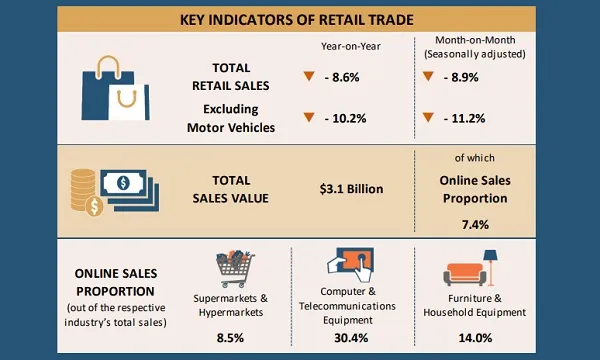
Singapore's retail sales dropped 8.6% to $2.15b in February
Industries selling discretionary items were affected by a decline in tourist arrivals.
Retail sales in Singapore fell 8.6% YoY and 8.9% MoM to $2.15b (S$3.1b) in February, according to data from the Department of Statistics (SingStat). Excluding motor vehicles, retail sales fell 10.2% YoY.
This was mainly attributed to larger declines in retail industries selling discretionary items, due to the decline in tourist arrivals and lower domestic consumption as a result of the COVID-19 outbreak.
The sales for clothing & footwear and food & alcohol industries, as well as department stores plunged between 36.3% and 41.0% YoY. Other industries such as that of watches & jewellery (23.8%) and cosmetics, toiletries & medical goods (13.3%) also recorded declines.
On the other hand, the sales for supermarkets & hypermarkets rose 15.5% as groceries saw higher demand.
Online retail sales made up about 7.4% of the total sales for the month. Online sales of computer & telecom equipment, furniture & household equipment and supermarkets and hypermarkets made up 30.4%, 14% and 8.5% of the total sales, respectively.
The sales of food & beverage (F&B) services slid 16.6% YoY to $507.89m (S$732m) for the month, also due to declined consumption amidst the outbreak. On a MoM SA basis, sales slipped 18.3%. Online food & beverage sales made up an estimated 12.5% of the total sales.
The turnover of food caterers and restaurants crashed 31.5% and 29.1%, respectively. In contrast, sales of fast food outlets climbed 5.8% during this period. Meanwhile, sales of cafes, food courts & other eating places dipped 2.3%.



















 Advertise
Advertise






